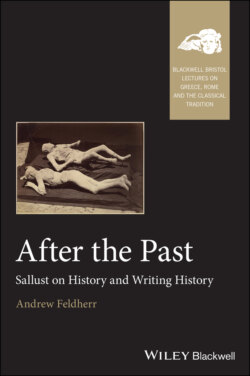After the Past

Реклама. ООО «ЛитРес», ИНН: 7719571260.
Оглавление
Andrew Feldherr. After the Past
After the Past. Sallust on History and Writing History
Contents
Guide
Pages
Acknowledgments
Introduction
Notes
1 Lives and Times
I
II
Notes
2 Words and Deeds
I
II
III
IV
Notes
3 Pity and Envy The Emotions in Sallustian Historiography
I
II
III
Notes
4 Tragic Jugurtha Numidia, New Media, New Medeas
I
II
III
Notes
5 Lines in the Sand The Representation of Space in the Jugurtha
I
II
III
Notes
6 Brevitatis Artifex Sallust as Text
I
II
III
IV
Notes
Epilogue
Notes
Abbreviations
Bibliography
Index of Passages
Index
WILEY END USER LICENSE AGREEMENT
Отрывок из книги
Andrew Feldherr
If Bristol counts as the Everest of my career, the Princeton of those years was its lofty cloud forest, a habitat it was my unbelievable good fortune to share with the sage pandas, shimmering snow leopards, and mobile langurs that made up its storied fauna. One of the great satisfactions of completing this project has been to recognize how profoundly it has been shaped by the work of so many of my Latinist colleagues. My use, and occasional abuse, of the scholarship of Yelena Baraz, Ted Champlin, Denis Feeney, Harriet Flower, Bob Kaster, Dan-el Padilla Peralta, and Brent Shaw throughout the chapters to follow shows but the traces of a much larger personal and intellectual debt. (And I hope that my old friend Andrew Riggsby, who visited Princeton during that period, will allow himself to be counted in this number.) Further thanks are due to Princeton’s Council of the Humanities, from whom I received an Old Dominion Fellowship, which provided me with leave to write my lectures and allowed me to share the weekly colloquia of its Society of Fellows. Support was also offered by the Loeb Classical Library Foundation.
.....
As the final stage of my demonstration of the importance of temporal perspective for making sense of Sallust, I want to show how the opening of the Catiline stages the tension between the timeless truths of philosophy and history’s account of passing time.22 The generic interference of philosophy teaches its audience how to read history in two important ways. First, it continually raises the question of how to view the recent past, with a recognition of the temporal continuities that make the audience’s reading contingent upon the history the text describes, or from the perspective of a philosophical audience, taking their virtues with them as they depart from Rome. Equally important will be the image we form of the nature of Sallust’s own language, for consideration of that key term virtus, where the twin discourses of history and philosophy intersect, makes the reader decide both whether Sallust’s history represents the “real reality” of history, as Aristotle suggests he should, or some more general abiding essence, and, more fundamentally, whether his words can represent anything at all.
To begin, it is important to remember that the question of how to conceptualize time is raised for the reader not just through subtle play with generic conventions, such as the retrospective contrast between claims about omnis homines and history’s focus on the increasingly fragmented parts of this whole; indeed, it is central to the argument of the passage. The distinction between what lasts and what passes away quickly structures the human individual. However, as emerges throughout the work, there are some who nevertheless focus their energies on the brief and fleeting glory of wealth and bodily attributes. There are thus those who look at themselves from the perspective of eternity and those who do not.
.....